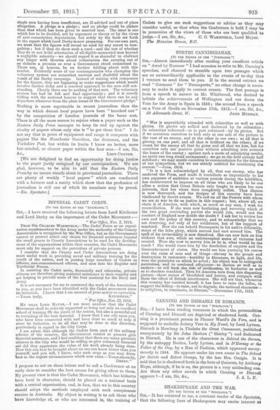IMPERIAL CADET CORPS. [To Tip EDITOR OP THE "SPECTATOR:1
have received the following letters from Lord Kitchener and Lord Derby on the importance of the Cadet Movement :—
" War Office, Nov. 2, 1915. DEAR SIR Crtaarats Virsirzersr.n,—The Cadet Force as an organi- zation supplementary to the Army under the authority of the County Associations is recognized by the War Office, but as the Government cannot at present admit any claims for financial assistance beyond the small grants to County Associations to be used for the develop- ment of the organizations within their counties, the Cadet Movement must rely for support on the patriotism of private persons.
I consider that the County and Cadet Associations are doing most useful work in providing naval and military training for the youth of the nation, and in passing large numbers of Cadets as officers, non-commissioned officers, and men into the Regular and Territorial Forces.
In assisting the Cadet units, financially and otherwise, private citizens are therefore giving material assistance to their country and are helping to provide some of the beet material for the Navy and Army.
It is not necessary for me to commend the work of the Association to you, as you have been identified with the Cadet movement Dino() its initiation. I know that I am assured of your active co-operation. —Yours truly, • KITCHENER." " War Office, Nov, 22, 1915. MY DEAR LORD MAYOR, —I am most anxious that the Cadet Movement shall be actively supported as being not only an excellent school of training f8r the youth of the nation, but also a powerful aid to recruiting of the best material. I know that I can rely upon you, who have boon connected with and have done so much to help it since its Mitiation, to do all that may be done in this direction, particularly in regard to the City Corps. I am aware that although the Cadets form part of the military
scheme of the country, the Government cannot at present give financial assistance, and I feel confident that there aro many patriotic citizens in the City who would be willing to give voluntary financial aid did they appreciate the value of the work already being done. How this can best be brought about no one can know better than you yourself, and you will, I know, take such stops as you may deem best in the urgent circumstances which now exist.—Yours sincerely, DERBY."
I propose to act on these letters and to call a Conference at an early date to consider the best means for giving effect to them. My present view is that the Cadet Movement, which has hitherto been local in character, should be placed on a national basis with a central organization, and, in fact, that we in this country should adopt the methods employed with such conspicuous success in Australia. My object in writing is to ask those who have knowledge of, or who are interested in, the training of Cadets to give me such suggestions or advice as they may consider useful, so that when the Conference is held I may be in possession of the views of those who are best qualified to


































 Previous page
Previous page